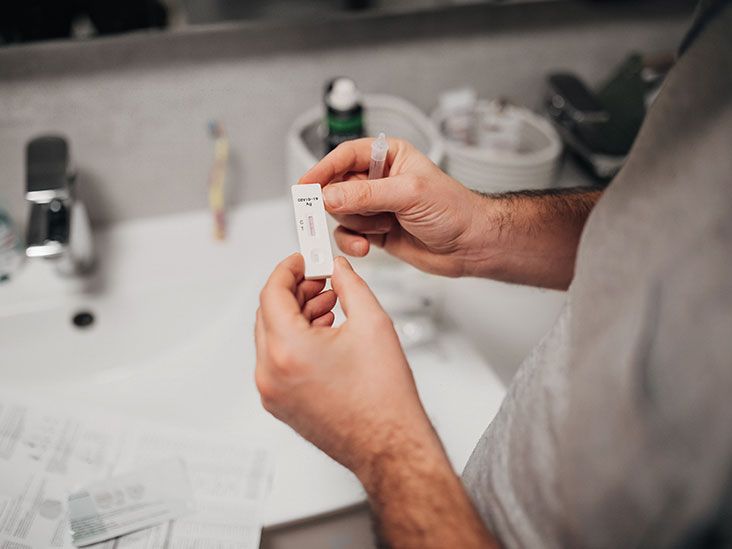COVID-19 can have many impacts, both physical and psychological. One question that keeps coming up in the media and recent literature is whether there is a link between COVID-19 and erectile dysfunction.
In this article, we look at numerous studies on the associations between COVID-19 and erectile dysfunction (ED).
We also explore whether ED can increase the risk of COVID-19, potential complications of COVID-19, treatments for ED, and when to contact a doctor.
Several studies explore COVID-19’s effects on ED.
Looks like it can
All data and statistics are based on publicly available data at the time of publication. Some information may be out of date. Visit our coronavirus hub for the most recent information on the COVID-19 pandemic.
Researchers involved in a 2021 pilot studyTrusted Source examined the penile tissues of four people, two with a history of COVID-19 infection and two without. Results suggests the two that had COVID-19 showed a presence of the virus function in their biopsies. The scientists conclude that the body’s cell dysfunction from COVID-19 infection can contribute to ED.
A 2022 statistical studyTrusted Source involving global data of over 66 million people — excluding those that already had ED before January 2020 — indicates there is a higher chance of getting ED after COVID-19 infection. However, this study relies on statistical data from a global database instead of a blind clinical study, which is an important limitation.
Another 2022 study among 348 participants attempts to determine if COVID-19 can cause testicular damage. Comparing testosterone levels before and after COVID-19 in a 1-year span, this study suggests those positive for COVID-19 had a greater decrease in testosterone levels than those who did not get the infection.
A 2022 reportTrusted Source looking at 693 publications in the realm of COVID-19 and ED points to compelling evidence that the virus may harm males’ health and sexual function. This includes a nearly 6-fold higher risk of getting ED.
COVID-19, mental health, and ED
One 2022 studyTrusted Source among 156 males at the beginning of COVID-19 infection and in the month after getting COVID-19 found they had more depression and anxiety and a lower erectile function score. This could indicate that COVID-19 may result in more anxiety, which in turn increases the chance of ED.
A 2020 reportTrusted Source explores how experiencing an infection with severe acute respiratory syndrome in 2002 affected people’s mental health. It suggests that the infection was capable of having a long-term negative impact on mental health and that COVID-19 may be similar.
According to a 2022 report by the National Institutes of Health (NIH), people with chronic long-term depression or persistent feelings of loneliness were 81%Trusted Source more likely to experience hospitalization after a COVID-19 diagnosis. This suggests that COVID-19 may be a psychological risk factor for mental health.
A 2020 reportTrusted Source states that sexual performance anxiety contributes to premature ejaculation and ED. Therefore, it seems reasonable that general anxiety may also have an effect. In fact, a 2021 studyTrusted Source involving adult males suggests that those with anxiety disorders have a high risk of developing ED.
Further research
The above studies show an association between COVID-19, anxiety or depression, overall health, and ED.
However, people can have underlying health conditions that affect the results. Most of the studies state that more research is necessary to truly explore the link between COVID-19 and ED.

 www.medicalnewstoday.com
www.medicalnewstoday.com
In this article, we look at numerous studies on the associations between COVID-19 and erectile dysfunction (ED).
We also explore whether ED can increase the risk of COVID-19, potential complications of COVID-19, treatments for ED, and when to contact a doctor.
Several studies explore COVID-19’s effects on ED.
Looks like it can
All data and statistics are based on publicly available data at the time of publication. Some information may be out of date. Visit our coronavirus hub for the most recent information on the COVID-19 pandemic.
Researchers involved in a 2021 pilot studyTrusted Source examined the penile tissues of four people, two with a history of COVID-19 infection and two without. Results suggests the two that had COVID-19 showed a presence of the virus function in their biopsies. The scientists conclude that the body’s cell dysfunction from COVID-19 infection can contribute to ED.
A 2022 statistical studyTrusted Source involving global data of over 66 million people — excluding those that already had ED before January 2020 — indicates there is a higher chance of getting ED after COVID-19 infection. However, this study relies on statistical data from a global database instead of a blind clinical study, which is an important limitation.
Another 2022 study among 348 participants attempts to determine if COVID-19 can cause testicular damage. Comparing testosterone levels before and after COVID-19 in a 1-year span, this study suggests those positive for COVID-19 had a greater decrease in testosterone levels than those who did not get the infection.
A 2022 reportTrusted Source looking at 693 publications in the realm of COVID-19 and ED points to compelling evidence that the virus may harm males’ health and sexual function. This includes a nearly 6-fold higher risk of getting ED.
COVID-19, mental health, and ED
One 2022 studyTrusted Source among 156 males at the beginning of COVID-19 infection and in the month after getting COVID-19 found they had more depression and anxiety and a lower erectile function score. This could indicate that COVID-19 may result in more anxiety, which in turn increases the chance of ED.
A 2020 reportTrusted Source explores how experiencing an infection with severe acute respiratory syndrome in 2002 affected people’s mental health. It suggests that the infection was capable of having a long-term negative impact on mental health and that COVID-19 may be similar.
According to a 2022 report by the National Institutes of Health (NIH), people with chronic long-term depression or persistent feelings of loneliness were 81%Trusted Source more likely to experience hospitalization after a COVID-19 diagnosis. This suggests that COVID-19 may be a psychological risk factor for mental health.
A 2020 reportTrusted Source states that sexual performance anxiety contributes to premature ejaculation and ED. Therefore, it seems reasonable that general anxiety may also have an effect. In fact, a 2021 studyTrusted Source involving adult males suggests that those with anxiety disorders have a high risk of developing ED.
Further research
The above studies show an association between COVID-19, anxiety or depression, overall health, and ED.
However, people can have underlying health conditions that affect the results. Most of the studies state that more research is necessary to truly explore the link between COVID-19 and ED.

COVID-19 and erectile dysfunction: Link, risks, and more
There is a growing body of research investigating the relationship between COVID-19 and erectile dysfunction. Learn more about the studies here.
 www.medicalnewstoday.com
www.medicalnewstoday.com







